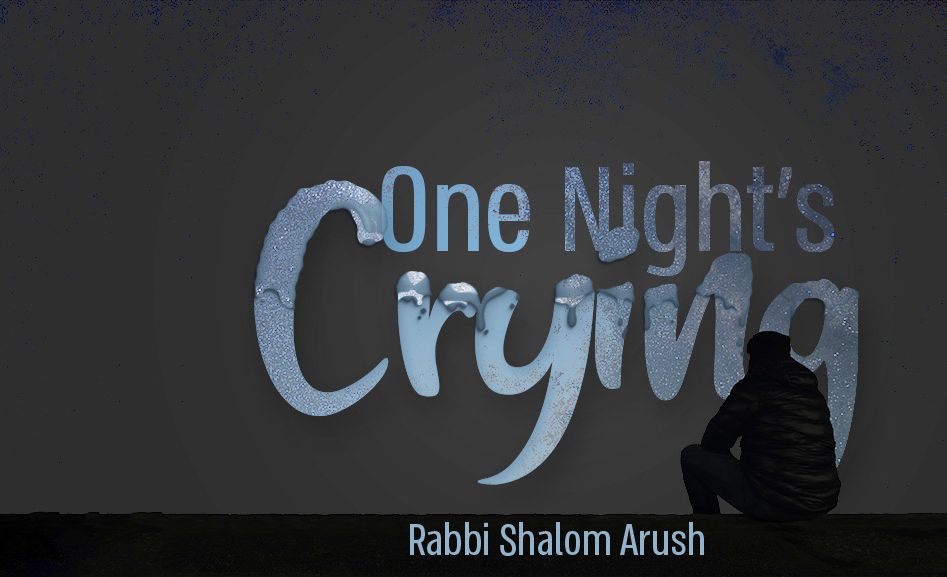
Needless Crying
Our sages tell us that because of one night’s crying for nothing (that happened to be on the night of Tisha B’av), the Jewish people would cry for posterity…

Translated by Rabbi Lazer Brody
In Forest Fields, Part 44
Most people entertain the misconception that tears and wailing are what constitutes good prayer. They’re disappointed if they don’t cry during the silent Amida or during hitbodedut, citing the Gemara that says the gates of tears are never closed. Yet, perfect prayer is the prayer that emerges from joy, for crying and tears are liable to be damaging.
Rebbe Natan of Breslev cites (see Likutei Halachot, Kriat Shema, 2) King David’s directive in Psalm 100 to serve Hashem with joy, referring to prayer, which is called “service of the heart.” Our sages conclude (Gemara, tractate Berachot 31a) that one should pray with the orientation of joy.
How then do we reconcile the apparent contradiction in the Gemara (ibid, 32b) that the gates of tears are never locked? These are not the tears of despair, but the tears of longing for Hashem. Even though tears have their value in stimulating deep emotion and intent, what we call “kavanna” in prayer, if not used properly, tears can cause many people to slip into self-pity and a mindset of complaint and discontent. As such, only the tears of joy and yearning for Hashem are effective in unlocking the gates of prayer. But, with joy and gratitude, there are no gates at all. The prayer that results from inner joy is an agent for healing and salvation for virtually everything.
Caution – crying for nothing!
 Tears during prayer are not prerequisites for our prayers to be accepted, as many people seem to believe. In fact, they could be detrimental, especially if a person cries for no reason. As we mentioned previously, the Midrash and the Gemara both tell us that because of one night’s crying for nothing (that happened to be on the 9th day of Av, what’s known in Hebrew as Tisha B’av), the Jewish people would cry for posterity. From this decree came the destruction of both Holy Temples, the Spanish Inquisition, and the exile of our people to this very day…
Tears during prayer are not prerequisites for our prayers to be accepted, as many people seem to believe. In fact, they could be detrimental, especially if a person cries for no reason. As we mentioned previously, the Midrash and the Gemara both tell us that because of one night’s crying for nothing (that happened to be on the 9th day of Av, what’s known in Hebrew as Tisha B’av), the Jewish people would cry for posterity. From this decree came the destruction of both Holy Temples, the Spanish Inquisition, and the exile of our people to this very day… There is no transgression in the Torah that has even one millionth of the punishment that crying, complaining, and ingratitude have, as we so blatantly see in the aftermath of the complainers, which the Torah calls ‘nirganim’ – those who cry and complain for no reason. King Solomon, the wisest of all men says (Proverbs 16:28), Nirgan mafrid aluph, in other words, complaining creates a total breach with Hashem, Heaven forbid. In other words, as soon as a person cries for no reason, he severs himself from Hashem, Heaven forbid.
A wonderful benefit
“And Yeshurun waxed fat and kicked (Deuteronomy 32:15)” is the Torah’s own testimony that when people are too successful, too affluent, and too comfortable, they not only drift away from Hashem, but they kick as well!
Imagine that you had a seven-figure annual income after taxes, career success, public recognition, prestige, a perfect marriage, perfect health, wonderful problem-free children, and all the amenities in life you dreamed of. Would you be calling Hashem’s Name? Would you seek Him at all? The Torah says no. Because Hashem does everything for the best, He doesn’t put us in a situation that’s conducive to spiritual slumber.
Life’s difficulties and challenges are wonderfully beneficial in that they stimulate us to seek Hashem constantly. Our deficiency prods us to pray with fervor. Our setbacks prevent us from becoming arrogant and trigger heartfelt pleas for Hashem’s assistance and guidance. Knowing how our troubles in life are so spiritually beneficial – in this world and in the world to come – we must thank Hashem for them always!
A woman came to me with a terrible case of acne that scarred and marred her face. She desired to do a six-hour session of hitbodedut to invoke Divine compassion.
I told her that she could certainly do a lengthy personal prayer session, but to begin by thanking Hashem for her acne, for by virtue of her terrible complexion problem, she’s making spiritual growth in leaps and bounds. If she were a magazine-cover model, she certainly wouldn’t be seeking Hashem. Once she makes peace with Hashem and truly believes that her problem is indeed for her ultimate benefit, then she can contemplate in her hitbodedut why Hashem is using this particular problem as an attention-getter or wake-up call.
Pray with a smile
When a person is not grateful to Hashem for his problems, he doesn’t understand and appreciate the true kindness and mercy that is instilled in this "problem". If he prays by crying and complaining, as if Hashem had, G-d forbid, wronged him – such a prayer does more harm than no prayer at all. Many people err in this way; all of their prayer sounds like complaint, lacking the faith that all is for the good.
On the other hand, if a person prays with joy, he doesn’t risk being turned away. Hashem will smile with gratification. Tears that result from one’s yearning for Hashem or a broken heart are no problem. But, crying should not be the central element of one’s prayer, for he is then liable to fall into pointless crying, which is very detrimental.
We shouldn’t begin any prayer that will be a weeping and grievance session. Rebbe Nachman teaches (Likutei Moharan II:24), that even from a truly broken heart, one can easily fall into sadness, and all the more so when at the outset, one intends to make a complaint. The transgression of sadness is much more severe than any other sin. For pointless crying, a terrible decree was brought down upon generations, which incurred a punishment more severe than that of any other wrongdoing in the Torah.
The next few pages show several examples of how to correctly cope with the challenges of life, and how one should approach each prayer in such a way that it will be accepted. Also, one will be able to reinforce emuna and to become close to Hashem in every situation, better or worse. Even from the very greatest sorrow, one can merit spiritual growth, recognize the merciful Creator, and be redeemed from his sorrows as well.
To be continued.














Tell us what you think!
Thank you for your comment!
It will be published after approval by the Editor.